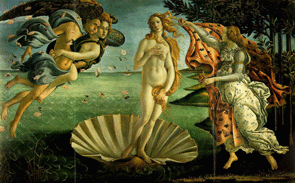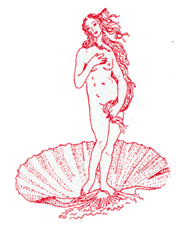| Boticelli, Self-censorship | ||
 |
||
| ...and Calculus |
| Boticelli, Self-censorship | ||
 |
||
| ...and Calculus |
Okay, I had some weirdness today. Sometimes I like to stamp a "great work of art" on good homework and test papers. Thanks to the generosity of Laurel, I have quite a collection of them. So, today I was stamping away at my students' homework, and it was Boticelli's turn in the rotation. Nothing unusual, until suddenly, the internal censor took a step back and asked, "And what do you think YOU are doing?" And I said, "I am stamping students' papers with a fine art stamp. An affectation, perhaps, but nothing for you to be concerned about." And the internal censor said, "FIRST of all, you ended that last sentence with a preposition. SECOND of all, I see you preparing to hand papers back to minors with a naked lady drawn on them." "What?" I said.
 |
"THAT," said the internal censor, "is a naked lady. And YOU," he continued, "teach students who are under eighteen." |
When he put it that way, of course, he was correct. Last year, when I used the Boticelli stamp, I didn't think twice about it. But I have had some interesting experiences since then. For example, I did a sample seminar in front of a whole group of educational consultants, after which there was a one hour feedback session. And I had a very interesting discussion with a friend on the the attempts to change the University of Illinois mascot. And, like every year, I've had plenty of conversations with people about teaching, and about how I can make sure my class is filled with education for all.
My problem is that it is impossible to justify a single joke. Impossible. For example, at the seminar, I asked a group of four instructors to discuss whether a book such as Ulysses could be considered a "Great Novel" if everybody who reads it, hates it. (That was the premise. I'm aware that there are people who like it. Don't email me about James Joyce.) The idea of the activity was to have the rest of the seminar participants analyze the ensuing group dynamics, and to observe how both the written activity and my behavior fostered, or failed to foster, discussion within the group. The written question began by talking about how much difficulty I was having with the novel, included a sample paragraph, and then mentioned again how much I disliked it. The group discussed the question, and came to the conclusion that such a novel can still be considered "great."
As they were returning to their seats, I addressed the observers, saying something like, "See? We have four people of different research backgrounds, who took a question from still a different field, and they were able to discuss this question and come to a conclusion" and then in a softer voice "albeit the wrong one." Ha ha, and then we discussed their group dynamics.
During the feedback session, that comment was addressed. How I told students to have an open discussion and then, afterwards, I discounted everything they said. That was literally true. I did that. It was a joke. I had been standing in a room full of people who are experts on group-dynamics and education, so I thought it would be funny to say the worst possible thing. Or maybe I thought it would be funny just to slam James Joyce once more. Or maybe they were taking a while to get to their seats, and I thought the timing of the situation demanded that something silly come out of my mouth. I really can't remember. The point is, that as soon as I was standing there in a room full of people more knowledgeable than I, being asked to justify why I thought a particular phrase was funny enough to be worth saying, the humor just kind of went away.
Humor is notorious for that. I remember my Hebrew School teacher, Shalom Mishkin, asking me, "So, you deliberately broke your pen and blew the ink on Howard's paper. Why? Did you think that was FUNNY?" Well, the honest answer was "Yes." I did. But for some reason, with the entire class looking at me, and blue ink all over my hands and shirt and probably my lips, it just didn't seem funny anymore.
So I probably shouldn't have said, "albeit the wrong one." Now I am picturing myself in the future, standing in front of a panel consisting of two Regents, two department heads, two student representatives, a union steward and a journalist. Projected on the wall behind me is this:
![]()
And someone speaks into a microphone and asks, "Please tell us, Doctor Shaw, why you thought this would be an appropriate image to place on the homework paper of a seventeen year old girl." Really, now, what could I say? I couldn't even use the "great art" rationale, because, after all, this is a math class.
Now, some of you are thinking, "You shouldn't have used the image, for it could be offensive and exclusionary." And you have a point. And some of you (hi Mom!) are thinking "Whether or not you think it was appropriate, why risk getting in trouble for it? It's not worth the tsouris - you shouldn't have used it." And you have a point, too. And some of you are thinking of an impassioned yet logical argument for me to give my judges. You would lose. There is no way to justify the above image when standing in front of people in business-wear wielding microphones. The whimsy of the stamps, and my office with the lava-lites, and the class of laughing students are all gone, and all that is left is a breast and a navel and the phrase "seventeen year old girl." There is nothing you can possibly say in that situation.
You can't justify any single joke. You can't justify any single image.
But here is the other side... There is a cumulative effect. Take all the kind of stupid little comments "albeit the wrong one", the gratuitous song-and-dance number at the end of the rationale for the technique of integration-by-parts, the making fun of the way physics people view Taylor series, the snide comments about the measure theorists, the mean statement about Denise Richards on one of the Wright Challenge problems, the dozens of self-depricating remarks, and yes Boticelli's Birth of Venus. I wouldn't be able justify any single one of these statements or actions if pressed. But there is a word that is rarely used anymore, in fact its only used once per year, and then never with meaning. That word is "Merry." I think that I teach a merry class. Not only that, I give merry seminars, and do merry work in my merry office. I can't point to one particular comment, or one particular stupid joke that makes a class merry. Heck, I even know that most of my jokes aren't objectively funny. But I think (and the evaluations have borne out) that my students enjoy coming to class, moreso than they usually do with a math class. And that includes the disadvantaged students, the non-traditional students, and the math-phobic students.
It would be no effort to just retire that one stamp, darn it. And I'm not the type of person to wear a T-shirt with the s-word written on it in a public place, just to make the point that the constitution guarantees that I can. And the internal censor is often right. You wouldn't believe some of the freaked up things I would say if it weren't for him. I'm not saying I should let it all hang out.
I'm saying that I have a stamp with one of the
"great works of art" on it, and that my students comment favorably
on the rubber-stamp foolishness, and I no longer know if it is okay to use it,
and I'm certainly not feeling as merry
about teaching as I usually do.
Respond via email
Back to Doug's Essays
Back to my personal page
Doug Code 6/2001: os uif cnk vrcuomg eftw lkm uif’nk jiomg ob yknu xkrr. zik phnotpqcx